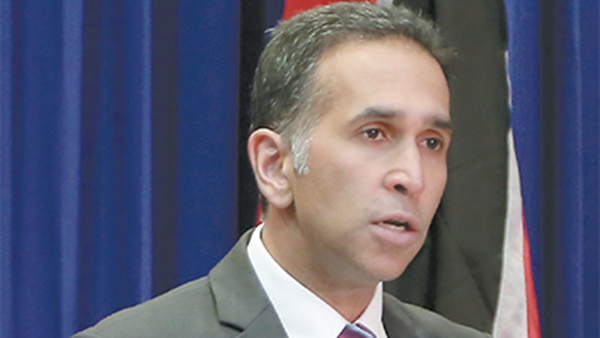PORT OF SPAIN, Trinidad and Tobago, December 12, 2019 (CMC) – The Trinidad and Tobago parliament approved of the Dangerous Drugs Amendment Bill, last night, as the first step towards the island decriminalising the of possession of less than 30 grams of marijuana for recreational and medicinal purposes.
But legislators agreed to send the Cannabis Control Bill, which seeks to establish an Authority for the control of cannabis, through a licensing regime, to a Joint Select Committee that will report back to parliament by February 29, next year.
Earlier, Attorney General, Faris Al-Rawi, said that the government had revisited a clause in the legislation that would have allowed four male marijuana plants, only in households. But he told legislators that this measure had been amended to make it, either male for female plants.
The Dangerous Drugs Bill will, among other things, decriminalize the possession of less than 30 grams of cannabis and during the debate, Health Minister, Terrance Deyalsingh, warned pregnant women against abusing cannabis, adding that mothers must exercise caution in using marijuana.
He said he had met citizens, who in their 40s and 50s, had, as babies, been victims of the thalidomide crisis.
“We have to tread lightly with marijuana. I don’t want us, in Trinidad and Tobago, to have the equivalent of the thalidomide babies,” Deyalsingh said, noting that just as a pregnant woman should not be given aspirin or ibuprofen, so too must prescribing doctors and pregnant women be careful over cannabis.
“This (legislation) is not a free-for-all to smoke cannabis, while pregnant,” Deyalsingh said, adding that globally, an estimated 2.5 percent of women use cannabis in their pregnancy.
He cautioned that their babies could face stillbirth, premature birth, smaller babies and behavioural problems, noting also that some pregnant women were drinking too much alcohol and smoking too many cigarettes.
He said at least 6.6 percent of pregnant women smoke cigarettes in their first trimester of pregnancy. Three percent use illicit drugs, while 4.7 percent consume alcohol, an amount he said was “too much”.
Deyalsingh said the amendment to the Dangerous Drugs Act to decriminalise cannabis, also outlaws dangerous psychedelic drugs, such as MDMA (ecstasy or molly) and ketamine. He said the bill will outlaw drugs, such as Fentanyl, plus the analogue drugs, created to have a slightly different molecular structure by crooks, seeking to evade a legal ban.
Otherwise Deyalsingh said the cannabis legislation was a very emotive and controversial topic, adding “you can’t please everybody, because everybody has got a hardened policy view they can support”.
Meanwhile, opposition legislator, Dr. Bhoendradatt Tewarie, caused laughter in parliament, when he described the Dangerous Drugs Amendment Bill as “bipolar”.
He told legislators that while the bill decriminalises cannabis, those who breach the legal stipulations face “some very hefty penalties and some draconian interventions”.
Tewarie said that walking into parliament earlier, he had seen some protesters saying “Say no to drugs,” while others wanted a total end to cannabis prohibition.
He said while the Attorney General had sought to do a balancing act in the legislation, he questioned why someone with over 60 grammes should face a TT$30,000 fine on conviction.
“Was part of the thinking behind the bill a revenue-generating measure? I don’t think this bill is the place to do it. Either you decriminalise or you don’t touch the decriminalisation issue,” he said.
The legislation is to be debated in the Senate, tomorrow, before being sent to President Paula-Mae Weekes.
 Pride News Canada's Leader In African Canadian & Caribbean News, Views & Lifestyle
Pride News Canada's Leader In African Canadian & Caribbean News, Views & Lifestyle





